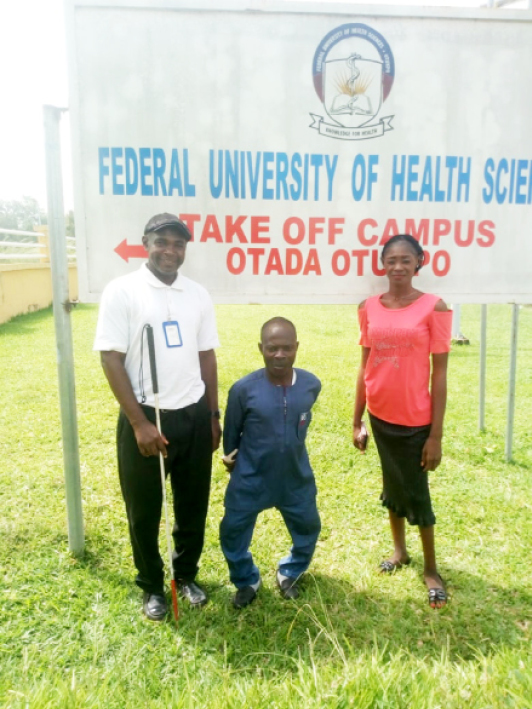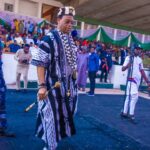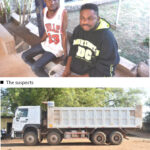Obeya Amanyi Ignatius is one of the Persons living With Disabilities (PWDs) in Benue State, who are bracing the odds of frustration and depression in the face of current economic turmoil to live above their physical challenges.
The visually impaired, who holds a first and second degree in Special Education from the University of Jos (UNIJOS), had against all odds thrived to become a responsible citizen not only to his immediate Otukpo environment in Benue State, but to the entire country.
Ignatius, though not without challenges, luckily secured a job recently with a tertiary institution in Otukpo, but the plight of many of his counterparts who are being neglected where they should ordinarily get employment worries him.
He said, “PWDs suffer more in the present Nigerian economic situation due to our impairment to assess fund and basic economic resources of life. In Benue, due to the unemployment situation, PWDs are experiencing untold hardship.
Investments needed to end violence against women, girls in Nigeria – NCWS
Jigawa gov seeks completion of 40-year-old Hadejia irrigation valley
“The challenges faced by PWDs in Benue State amid current economic difficulties are multifaceted. Limited accessibility to basic resources, education, and healthcare exacerbates their struggles, leading to heightened frustration and depression. The economic challenges further hinder their ability to access assistive devices and participate fully in societal activities.”
Buttressing Ignatius’s assertion, his counterparts – James Inalegwu and Rinret Yakubu – advocate for an improved living condition for PWDs whom they say are still discriminated against in terms of employment even within government-owned Ministries, Departments and Agencies (MDAs), stressing that the neglects indeed pose serious hurdle for them.
Inalegwu, a graduate of Physics, and Yakubu, a holder of Bachelor of Science degree in Computer Science, both physically challenged are optimistic that government could step up policies to address their myriad of concerns.
But in the thinking of Ignatius, “While government efforts and initiatives by stakeholders exist to address inclusiveness, implementation gaps persist. The enforcement of policies aimed at supporting PWDs remains inconsistent, hindering the effectiveness of these measures. Additionally, there is a need for increased collaboration between government agencies and non-governmental organisations to create sustainable solutions for PWDs.
“Despite strides toward inclusiveness, discrimination against PWDs in government-owned MDAs remains prevalent, particularly in employment. Barriers such as inaccessible workplaces and negative perceptions contribute to their underrepresentation. Addressing these issues requires proactive measures, including sensitisation programs, reasonable accommodations, and inclusive hiring practices within government institutions.
“To address some of our challenges, I will recommend for a commission or a disability rights commission in Benue that will be headed by someone with disability too who understands the psychology of PWDs.”
On his part, John Ode, a Disability Inclusive Development Expert, has made efforts to ensure inclusiveness for persons with disabilities in Benue State, a move said to be commendable and essential for creating a more equitable and accessible society.
Ode in a conversation with our correspondent in Makurdi noted that creating an environment that caters for the needs of persons with disabilities is not only a matter of social justice but also aligns with the principles of human rights and sustainable development.
He said that in Nigeria, as in Benue State, there are challenges related to inclusivity for persons with disabilities, particularly within government offices, stressing that these challenges often include physical barriers, limited access to information, inadequate training for government staff on disability issues, and a general lack of awareness about the rights and capabilities of individuals with disabilities.
“Efforts to address these challenges should involve the implementation of policies and practices that promote inclusivity at all levels of government. This may include providing reasonable accommodations, ensuring accessible infrastructure, and offering training programs for government employees to better understand and serve the needs of persons with disabilities.
There is often a lack of awareness among government officials about the diverse needs and capabilities of persons with disabilities. This can lead to unintentional discrimination and the exclusion of individuals with disabilities from various government programs and services. Inclusive Policies: While there may be policies in place to support persons with disabilities, their effective implementation is crucial. Ensuring that these policies are actively enforced and regularly reviewed for improvement is essential for creating a truly inclusive environment.
Meanwhile, the Programme Manager of Elim Christian Vocational Training Centre (CVTC) for the Disabled, Emmanuel Egbodo, told participants at a recent training for journalists in Makurdi that his organisation would ensure the inclusion of PWDs while implementing the “Enabling Resilience To Climate Change (ER2CC) project in Benue State which is funded by European Union and Christian Blind Mission (cbm).
Egbodo emphasised that the project in would be implemented with intentions to ensure that persons with disabilities and their representing organisations are actively involved in climate-change related policy processes in the state.
Also speaking recently at a function in Makurdi, the Special Adviser to Benue State Governor on Special Needs, Bem Anshe, a visually impaired, harped on the need for the state government to always factor in the needs of PWDs in all their advocacies and programmes so as to close the information barrier between them and the government.
He appreciated Governor Hyacinth Alia for projecting the needs and interests of PWDs by creating an office for the Special Adviser for Special Needs and subsequently, appointing him, Bem Anshe, to serve in the capacity of adviser.

 Join Daily Trust WhatsApp Community For Quick Access To News and Happenings Around You.
Join Daily Trust WhatsApp Community For Quick Access To News and Happenings Around You.


